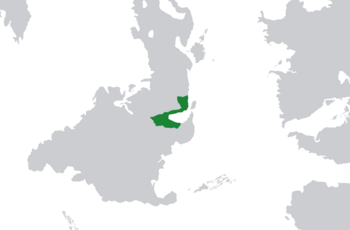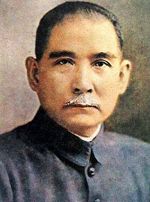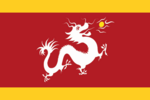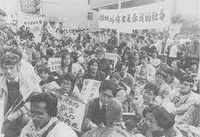Difference between revisions of "Kingdom of Monsilva"
| Line 117: | Line 117: | ||
In the mid 1970s, the protests briefly decreased for reasons likely associated with new anti-protest equipment acquired by the police as well as the introduction of the death sentence for protesting against the government, as well as the introduction of shoot-on-site permission for all military police who believe they are under threat. These laws made it very difficult for people to protest. This lead to the creation of the [[Monsilvan Revolutionary Army]], which had the goal of developing a paramilitary to directly oppose the government's military police and overthrow Shao Yaoting and his government. The MRA began its riots in 1976, and began its operation to arrest Shao Yaoting at the beginning of 1978. | In the mid 1970s, the protests briefly decreased for reasons likely associated with new anti-protest equipment acquired by the police as well as the introduction of the death sentence for protesting against the government, as well as the introduction of shoot-on-site permission for all military police who believe they are under threat. These laws made it very difficult for people to protest. This lead to the creation of the [[Monsilvan Revolutionary Army]], which had the goal of developing a paramilitary to directly oppose the government's military police and overthrow Shao Yaoting and his government. The MRA began its riots in 1976, and began its operation to arrest Shao Yaoting at the beginning of 1978. | ||
| − | The [[1978 Monsilvan protests]] is the most violent period of Monsilva's martial law period, and likely the most brutal year in Monsilvan history. The most violent and largest of these riots was the [[1978 Jingtianmen Square massacre|Jingtianmen Square riot]] in [[Amking]], in which several hundred people died, including rioters and police. After this, many people within the MRA began acquiring firearms supplied by mostly unknown sources and using them against the police. In November 1978, the MRA stormed the Monsilvan government building in Amking and the royal complex in [[Sanzhong]] at the same time resulting in the arrest of the [[Wang Emperor]] | + | The [[1978 Monsilvan protests]] is the most violent period of Monsilva's martial law period, and likely the most brutal year in Monsilvan history. The most violent and largest of these riots was the [[1978 Jingtianmen Square massacre|Jingtianmen Square riot]] in [[Amking]], in which several hundred people died, including rioters and police. After this, many people within the MRA began acquiring firearms supplied by mostly unknown sources and using them against the police. In November 1978, the MRA stormed the Monsilvan government building in Amking and the royal complex in [[Sanzhong]] at the same time resulting in the arrest of Shao Yaoting and the unrequested, but unpunished, murder of the [[Wang Emperor]]. Later, on 25 December, the leader of the MRA, [[Xu Zhou-da]] would proclaim the [[Monsilvan Republic]]. |
==Politics== | ==Politics== | ||
Revision as of 09:19, 5 June 2023
Kingdom of Monsilva | |||||||||||
|---|---|---|---|---|---|---|---|---|---|---|---|
Anthem: 山國龍之歌 Shānguó Lóng zhī Gē "Song of the Monsilvan Dragon" | |||||||||||
 Location of Kingdom of Monsilva (dark green) in Terraconserva (grey) | |||||||||||
| Capital and largest city | Amking | ||||||||||
| Official languages | Monsilvan | ||||||||||
| Religion | Folk, Buddhism | ||||||||||
| Demonym(s) | Monsilvan | ||||||||||
| Government |
| ||||||||||
| Emperor | |||||||||||
• 1830–1898 | Song | ||||||||||
• 1898–1943 | Qing | ||||||||||
• 1943–1978 | Wang | ||||||||||
| Prime Minister | |||||||||||
• 1830–1845 (first) | Chai Lin | ||||||||||
• 1962–1978 (last) | Shao Yaoting | ||||||||||
| Legislature | Royal Parliament | ||||||||||
| Historical era | Pre-republican period | ||||||||||
• Established | 1830 | ||||||||||
| 1909–1913 | |||||||||||
| 1928–1933 | |||||||||||
| 1962 | |||||||||||
| 1963–1978 | |||||||||||
| 1965–1978 | |||||||||||
• Disestablished | 1978 | ||||||||||
| Population | |||||||||||
• 1850 | 10,000,000 | ||||||||||
• 1977 | 36,500,000 | ||||||||||
| Currency | Monsilvan yupian (¥ or 玉) | ||||||||||
| |||||||||||
The Kingdom of Monsilva (Monsilvan: 山華王國; pinyin: Shānhuá Wángguó) was Monsilva between 1830 and 1978. The kingdom emerged from the Kingdom of Great Shan at the end of the Monsilvan Civil War in 1830. The kingdom was founded by Chai Lin, a general who had lead the Liberate Monsilva Movement to victory in the civil war. Chai was also the first Monsilvan prime minister, serving from the establishment of the nation in 1830 until his resignation at the 1845 general election. The kingdom encompassed all of modern-day Monsilva.
The Kingdom was the result of the abolition of absolute monarchy in Monsilva. Although the monarchy was retained, it was lead by the House of Yan with the first emperor being the Song Emperor who was the nephew of the Xuantong Emperor, who was the last emperor of the Great Shan, and the son of Bai Yan who had been a founding member of the Liberate Monsilva Movement and would have been Emperor had he not been killed during the Civil War. The monarch retained powers as Head of State, however the prime minister was now the Head of Government and all laws and decisions had to go through the parliament before being introduced or acted upon.
In the 19th century, Monsilva saw a period of peace and prosperity as its economy gradually grew as trade with neighboring nations and across the Kivu Ocean began increasing. Although the nation was economically stable, it was not stable politically. Frequent political tension between the two main political parties, the People's Culture Party and the Leaders of Parliament Party, caused immense corruption and blackmail. In 1909, the Monsilvan political reform movement began as a series of protests orchestrated across the country against the strict voting laws and electoral manipulation. These protests, after dying down breifly between 1910 and 1913, flared up again after the first 1913 general election, when prime minister Zhong Wei won a second term. In September of 1913, Zhong called a snap-election after being threatened by banishment from office by Emperor Qing. This was Monsilva's first election where the suffrage included all men above the age of 18. In the election, the National Party won for the first time. The NP lead Monsilva for 40 years and in this period Monsilva saw a large growth in economy, political stability and population. It also saw a big step forward in human rights such as universal healthcare, free primary education and women's voting rights.
After the death of the Qing Emperor in October 1943, the Wang Emperor, his nephew, became the next emperor of Monsilva. Wang was well known for being extremely generous with his money and his approval of absolute monarchy. Wang used his power to influence and blackmail many National Party politicians into stepping down in the period from 1947 to 1953 so that the Leaders of Parliament Party could return to power as they were in full support of the new emperor, while the National Party was pushing for a republic. In 1953, the LPP won, lead by Liang Huiqing. Liang was assassinated in May 1962, during his second term. Succeeding him was Shao Yaoting, who initiated martial law in 1963.
During the martial law period from 1963 to the kingdom's end in 1978, Monsilva went from a democratic constitutional monarchy to a dominant-party state lead by an authoritarian military lead regime supported by the monarch. By the 1968 general election, Shao Yaoting's party was winning over 80% of seats in the Legislative Assembly with election fraud being very blatant. Any opposition against Shao's regime would result in being arrested by the extensive military police force that was loyal to him. Around 1965 and 1966, protests began occurring across the country, but were often supressed quickly by the military police. However, the protests began becoming more active and violent over the following years, leading to events such as the Jingtianmen Square massacre. This initiated the creation of the Monsilvan Revolutionary Army as a direct opposer to Shao's regime. In the mid 1970s, the Revolutionary Army began orchestrating mass riots in cities across the country, and in 1978 began giving weapons to rioters. It is theorised that some neighboring countries that were against Shao's regime, such as Baltanla, provided supplies and possibly even weapons to the revolutionaries during the riots. In October 1978, the MRA arrested the entire Monsilvan government including the Wang Emperor. Then, on the 25 December 1978, Xu Zhou-da, leader of the MRA, established the Monsilvan Republic, ending the Kingdom of Monsilva.
Contents
History
Background
The Kingdom of Monsilva was established by the Liberate Monsilva Movement which had fought against the government of the Kingdom of Great Shan which had ruled over Monsilva from 1730 after it gained independence from the Empire of Baltanla until 1830 at the end of the Monsilvan Civil War. The Great Shan was an absolute monarchy, with the emperor being advised by the unelected deliberative council. Eventually this system and the mistreatment of the government against the working classes lead to the beginning of the Civil War in 1824 which started with the Liberate Monsilva Movement, lead by Chai Lin and Bai Yan declared northern Monsilva (modern states of Luhai, Leibo and northern Meixian) as an independent state known as 'Monsilva', a name that had been given to the country by many travellers and nations across the Kivu Ocean.
The war ended in 1830 with the occupation of Amking, where the government was located, and Sanzhong, where the emperor was located, by the LMM and the execution of the Xuantong Emperor and Cheng Peng, Head of the Deliberative Council at the time. On the 26 August 1830, Chai Lin and Bai Yan's son, the Song Emperor who was only 10 years old, officially declared the Kingdom of Monsilva as the successor to the Great Shan. Chai Lin became Monsilva's first prime minister.
19th century history (1830–1900)

Chai Lin, after establishing the Kingdom of Monsilva, served as prime minister for 14 years from 1830 until 1845, when he resigned at the age of 61 just before the 1845 general election after suffering from a heart attack. During his premiership, Monsilva saw a large reconstruction effort as people began rebuilding the country after the civil war which had devastated many of Monsilva's towns and cities. Chai Lin was extremely successful in Monsilva's first democratic elections, often winning over 60% of seats for the People's Culture Party in the Royal Parliament.
In the 1855 general election, another party, known as the Leaders of Parliament Party, won. This was the first time the People's Culture Party had not won an election. The LPP, a conservative and nationalist party, was lead by Cheng Li, who became Monsilva's 3rd Prime Minister and the first not from the PC Party. However Cheng Li's success was short lived, as his premiership was highly criticized for its failure to continue the reconstruction efforts at a desirable rate and its hiking of taxes. This lead to Chen resigning in May 1857 and a snap election being called, in which the PC Party returned to premiership under Deng Yahui.
During the premierships of Deng Yahui and Qin Zian, Monsilva began developing its international relations, particularly with neighboring Baltanla and Fujikuni as well as countries across the Kivu Ocean. This helped increase Monsilva's exports and is the start towards the country's economic transition from being autarkic to export-oriented. When the LPP returned to power in 1875 under the much more successful Gao Aiguo, he maintained Monsilva's trade relations and began focusing on developing Monsilva's industrialization. Although more successful, Gao was still fairly unpopular amongst the poorer citizens of Monsilva. This unpopularity lead to the prime minister facing two assassination attempts, the second, in March 1882, being successful. Gao was followed by Wu Zhong, who was at first was not much more popular and, although winning, failed to gain a majority in the Royal Parliament in 1885. Wu was responsible for massively decreasing unemployment in the late 1880s and early 1890s, which gained him more popularity amongst poorer citizens. However, after a number of conspiracies began circulating about Wu, his popularity declined and he lost the 1895 election to Lo Zhou, who became Monsilva's first prime minister in the 20th century.
Early 20th century (1900–1928)
The early 20th century saw significant developments to Monsilva's democracy. Up until 1913, every election in Monsilva had had very little suffrage, with voters having to be males with tertiary education and no criminal history or history of any type of mental health issues or learning disabilities, including minor disabilities dyslexia (known as 'word blindness' at the time). This limited suffrage lead to large amounts of proxy votes coming from individuals in poorer families who had managed to gain scholarships at universities and had become the only member in the family qualified to vote. Initially this problem had been ignored as the number of proxy votes had been insignificant, however with the increased numbers of scholarships being handed out at universities during the 1890s and 1900s, they had become a much larger problem. In December 1902, Lo Zhou died from pneumonia whilst still serving his third term. This lead to An Tian, his deputy, to become prime minister. However, An Tian had sever social anxiet disorder (known as 'social-phobia' at the time), and almost never came out of his office. This lead to an easy victory for Zhong Wei of the LPP who defeated An in a landslide in the 1908 general election.
Zhong Wei was the first prime minister to attempt to crackdown on the proxy vote problem. Zhong attempted to end proxy voting by strict surveillance at polling stations and implementing large fines to people who were discovered to be proxy voting. This lead to a lot of outrage amongst voters and non-voters alike which lead to large scale protests, the largest the country had seen so far. These protests are what lead to the intervention by the Qing Emperor, who although was supposed to politically neutral, was obliged by law to 'act on behalf of the people in times of need'. The Emperor gave Zhong an ultimatum: 'call a fair election, or resign with immediate effect'. This took place only a couple months after the first 1913 general election in May. Zhong called a snap election in September of the same year with all men over the age of 18 being permitted to vote, during the preparation period whereby people could register to vote, over one million formerly ineligible voters registered. The election resulted in the first win of the National Party, lead by Mao Yanlin. The win was a landslide and Mao retained premiership for just under 15 years until he resigned in June 1928 citing health issues.
Mid-20th century (1928–1953)
After Mao Yanlin's resignation, he was succeeded by Su Zian. Su was not as popular as his predecessor and was frequently criticized by women for being extremely sexist, claiming that women should never be permitted to vote as they 'wouldn't know what's best for them'. These comments made by Su and many people in his government lead to the Monsilvan civil rights movement which lasted from more or less the beginning of Su's premiership until his death from liver cancer in April 1933, one month before the general election in May of that year. In that one month between Su's death and the election, the role of prime minister was officially vacant, however Heng Lei who succeeded Su as the leader of the National Party served de-facto as prime minister in that period. Heng also managed to pass a legislation which permitted women to vote in the 1933 election during that month. The short time period lead to only a few women registering, however the number of registrations before the 1938 general election was astronomical.
Due to his legislation, Heng lost a lot of popularity amongst many of the more right-wing supporters of the National Party, and ended up in a minority government which he lead for 5 years until the 1938 election where he won a majority. Heng served as prime minister for 20 years, the longest of any prime minister in Monsilvan history as of 2023. During his premiership he was responsible for Monsilva's incredible economic, political and social developments, including universal healthcare, free primary education and women's suffrage. Monsilva was becoming a strong nation on the world stage and began developing a name for itself across Terraconserva.
In 1943, the Qing Emperor died without a son, which lead to his half-nephew, the Wang Emperor taking power as emperor. Wang was infamous for his liberal spending habits and support for authoritarianism. Some believed that the Wang Emperor was in fact illegitimate as some believed that he was the offspring of an affair between his father, Yan Xin, second son of the Song Emperor, and another woman who was not his wife. This belief was later found to be true after a DNA test done in 1986. The people who had believed Wang was illegitimate claimed that Wu Hui, son of the Song Emperor's only daughter, was the actual heir to the throne. In order to counter these beliefs, Wang claimed to be under a new dynastic family, the House of Wang.
After his accession to the throne, Wang began a secret blackmailing campaign, aiming to return the Leaders of Parliament Party to power as they were obedient to the emperor. In the 1953 general election, after the abrupt disappearances and resignations of many National Party politicians with fabricated reasons, the LPP gained power lead by Liang Huiqing.
Downfall of democracy (1953–1963)
With the LPP in power and Liang Huiqing as prime minister, the Emperor began becoming more and more affiliated with politics. He would frequently promote the LPP, and pro-LPP propaganda would pop up all across Monsilva, with many people believing many lies portrayed on the posters as contrary information was well hidden by the government. These subtle authoritarian changes would continue up to the next election in 1958, where the LPP would win a very large majority. With this majority Liang promised to continue Monsilva on its path to a 'strong country sitting high on the global stage'. During the beginning of Liang's second term in 1960 and 1961, many of Monsilva's authoritarian developments such as the frequent propaganda, disappearance of political opponents, and banning of some civil liberties such as eating on public footpaths, began reversing.
This all stopped in May 1963, when Liang Huiqing was assassinated while he was sitting at his desk in the prime ministerial residence in Amking. This lead to Shao Yaoting, the deputy prime minister and minister for the interior, and former army colonel, taking power. Shao claimed that Liang had been killed by an anti-monarchist member of the Monsilvan Communist Party, which was denied by Jiang Zedong, leader of the MCP. However, the communist party was extremely unpopular at the time due to the large amounts of anti-communist propaganda produced in Monsilva due to its two communist neighbours, so very few people believed Jiang. After the establishment of the republic, it was revealed that Shao Yaoting himself had shot Liang at the request of the Wang Emperor.
Martial law period (1963–1978)

Shao Yaoting was a strong supporter of the monarchy and believed that the royal family were a connection between the common person and heaven. The assassination of Liang Huiqing gave Shao an excuse to implement martial law as a 'precaution against immanent threat to Monsilva'. With martial law, Shao was able to use the military as Monsilva's primary policing force. He was also able to pass legislation without discussing with parliament first, however this ability was unnecessary as he also rigged elections by only allowing certain party's counts to be permitted. This rigging meant that the parliament was full of his supporters anyway.
The 1960s in Monsilva mostly consisted of the transition of Monsilva from democracy to authoritarianism, with many of Monsilva's political and social developments being reversed. Monsilva's economy was also seriously damaged, with many domestic companies being forcefully acquired by the government and then underfunded, and many international companies being exiled from the country. Shao attempted to return Monsilva to the autarky it was in the early 19th century, however the pressure he placed on the agricultural industry lead to many of Monsilva's infrastructure and manufacturing industries to take serious hits economically.
In 1965 and 1966, protests began erupting sporadically across Monsilva against the government. This was after the government began restricting travel in and out of the country, leaving many people unable to interact with their families who live abroad. Initially, these protests would be supressed with ease by the armed military police situated in every major town and city in the country. However as these protests began becoming more frequent, better organized and larger, the military police began having a harder time controlling them.
In the mid 1970s, the protests briefly decreased for reasons likely associated with new anti-protest equipment acquired by the police as well as the introduction of the death sentence for protesting against the government, as well as the introduction of shoot-on-site permission for all military police who believe they are under threat. These laws made it very difficult for people to protest. This lead to the creation of the Monsilvan Revolutionary Army, which had the goal of developing a paramilitary to directly oppose the government's military police and overthrow Shao Yaoting and his government. The MRA began its riots in 1976, and began its operation to arrest Shao Yaoting at the beginning of 1978.
The 1978 Monsilvan protests is the most violent period of Monsilva's martial law period, and likely the most brutal year in Monsilvan history. The most violent and largest of these riots was the Jingtianmen Square riot in Amking, in which several hundred people died, including rioters and police. After this, many people within the MRA began acquiring firearms supplied by mostly unknown sources and using them against the police. In November 1978, the MRA stormed the Monsilvan government building in Amking and the royal complex in Sanzhong at the same time resulting in the arrest of Shao Yaoting and the unrequested, but unpunished, murder of the Wang Emperor. Later, on 25 December, the leader of the MRA, Xu Zhou-da would proclaim the Monsilvan Republic.


